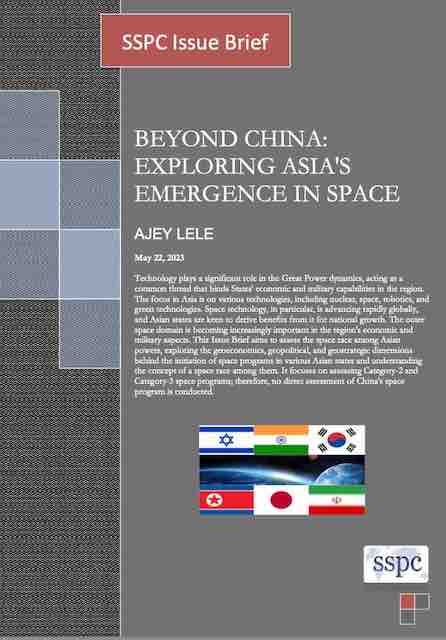Beyond China: Exploring Asia's Emergence In Space

The 21st century is known as the Asian Century. The terminology ‘Rise of Asia’ is mostly viewed synonymously with the ‘Rise of China’. However, other Asian states are also contributing to shaping this rise. Over the past two decades, Asian countries have experienced impressive economic and technological growth. Despite the global financial crisis in the mid-2000s, Asia has managed to revive itself, albeit with limited impact. Asia's strategic importance is increasingly recognized by major powers worldwide, mainly as it has emerged as one of the most attractive markets for the West. The overall economic growth and global market creation by Asian states are shifting the balance of power towards Asia, with expectations that this growth will eventually translate into influence.
Technology plays a significant role in the 'Great Power' dynamics, acting as a common thread that binds States' economic and military capabilities in the region. The focus in Asia is on various technologies, including nuclear, space, robotics, and green technologies. Space technology, in particular, is advancing rapidly globally, and Asian states are keen to derive benefits from it for national growth. The outer space domain is becoming increasingly important in the region's economic and military aspects. Some states have decades of experience in investing and innovating in space, while others are new entrants. Space technology investments have social, scientific, and strategic implications, with the economic dimension becoming more prominent recently. The issue brief aims to understand Asia's response to the space epoch in the context of regional power politics.
Globally, based on financial investments, technological expertise, and successful programs, the US, Russia, China, and the European Space Agency (ESA) can be considered "Category One" space powers. "Category Two" spacefaring states include Japan, India, and Israel. Among the remaining spacefaring states, both the Koreas and Iran fall into the "Category Three" designation. The "Category Four" could be states like Pakistan, Malaysia, Vietnam, and Indonesia. This issue brief aims to assess the space race among Asian powers, exploring the geoeconomics, geopolitical, and geostrategic dimensions behind the initiation of space programs in various Asian states and understanding the concept of a space race among them. This paper focuses on assessing Category-2 and Category-3 space programs; therefore, no direct assessment of China's space program is conducted.